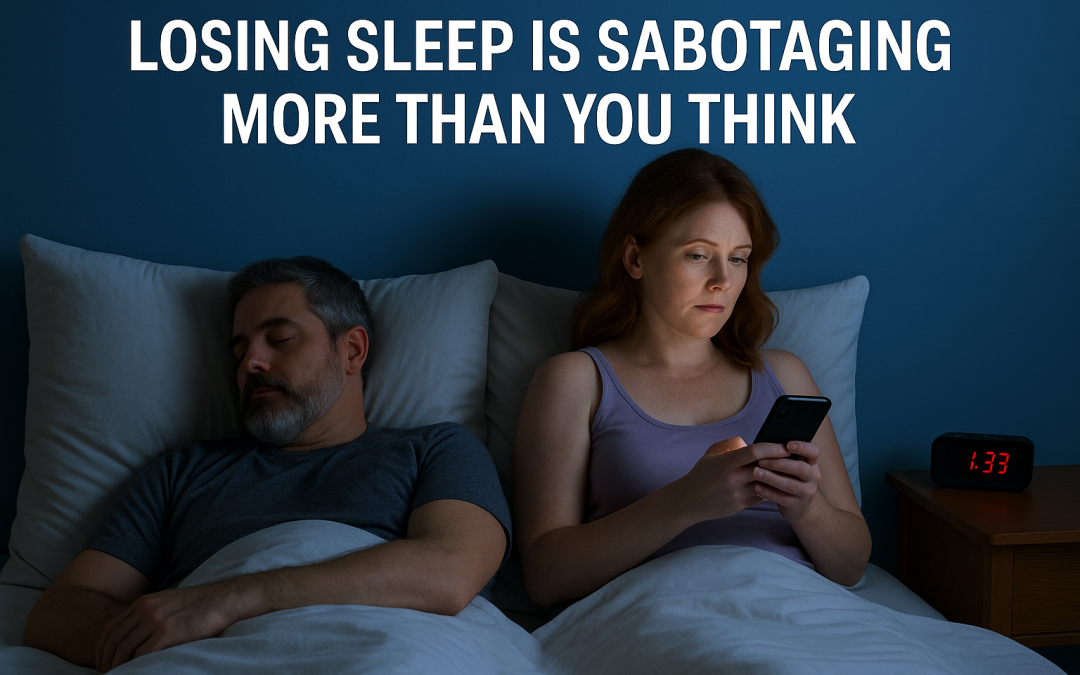Jane is a 42-year-old mom of two. Last night she climbed into bed at 10:30 PM, exhausted after a long day. But instead of turning off the light, she reached for her phone.
“Just a few minutes,” she told herself as she opened Instagram.
An hour later, she was still scrolling—eyes stinging from the glow, brain buzzing from one more video, one more post, one more laugh.
This habit has a name: bedtime procrastination. It’s when we put off sleep in favor of “me time”—usually with a phone in hand. But what feels like harmless relaxation is actually robbing the body of deep rest and setting off a cascade of damage that accelerates aging.
Let’s follow Jane’s next day to see how one night of bedtime procrastination can silently sabotage health.
Morning: The Fog Rolls In (0–6 hours awake)
Jane starts her day groggy.
-
Brain: By staying up late, she cut short her brain’s nightly “cleaning crew.” Free radicals weren’t fully cleared, leaving her foggy and unfocused.
-
Immune System: Her natural killer cells are sluggish, reducing her ability to fight off colds and viruses.
-
Stress Hormones: Cortisol, the stress hormone, is still running high. Instead of feeling calm, her body is already on edge.
Coffee helps her feel awake, but it can’t undo the oxidative stress that started building while she scrolled.
Midday: The Energy Crash (6–12 hours awake)
By lunchtime, the consequences start piling up.
-
Metabolism: Her cells are more insulin resistant, so her lunch causes bigger blood sugar swings and extra free radical activity.
-
Heart & Blood Vessels: Lack of sleep weakens nitric oxide balance, so her arteries stay tense, keeping her blood pressure up.
-
Gut: Sleep loss makes the gut barrier more permeable and shifts the microbiome toward inflammation.
She craves sweets to boost energy—classic fallout from sleep debt.
Afternoon & Evening: Running on Empty (12–18 hours awake)
By mid-afternoon, Jane’s dragging.
-
Liver: Antioxidant defenses that normally neutralize toxins are running at half capacity.
-
Muscles: Mitochondria are spitting out more free radicals, so physical tasks feel harder than usual.
-
Mood: Her brain’s decision-making center is dulled, so she’s irritable and less patient.
That “extra hour of me time” last night is costing her focus, energy, and resilience today.
Night: Repair Interrupted (18–24 hours awake)
By bedtime, Jane is wired but tired.
-
Heart: Blood pressure stays high instead of dipping like it should.
-
Sleep Hormones: Blue light from last night’s scrolling already reduced her melatonin rhythm, leaving DNA and cells less protected from damage.
-
Immune System: Nighttime repair signals are blunted, so tissues don’t heal as well.
Jane finally falls asleep—but her body is already paying the price for her late-night scrolling session.
The Bigger Picture
One night of bedtime procrastination won’t ruin your health. But night after night, the damage adds up. Chronic poor sleep raises oxidative stress, weakens organ systems, and accelerates aging—whether you’re 25 or 65.
The truth? Poor sleep quietly sabotages all the healthy choices you’re working so hard to make.
Sleep Debt Recovery: How to Catch Up and Restore Your Body
Even though you can’t “bank” sleep in advance, you can help your body recover from bedtime procrastination. The key isn’t just sleeping longer one night—it’s building consistent, high-quality sleep habits that restore energy and reduce oxidative stress over time.
5 Ways to Break the Bedtime Procrastination Cycle
- Charge your phone outside the bedroom – remove temptation altogether.
- Cut screens 1 hour before bed – blue light delays melatonin, your sleep-and-repair signal.
- Keep a consistent schedule – your body thrives on rhythm and predictability.
- Create a cool, dark sleep environment – set your bedroom for repair, not stimulation.
- Build a wind-down routine – swap scrolling for reading, journaling, or stretching to ease your body into sleep.
👉 Takeaway: Bedtime procrastination may feel like harmless downtime, but it’s one of the fastest ways to age your body before its time. Protecting your sleep isn’t just about feeling rested—it’s about protecting your long-term vitality.

